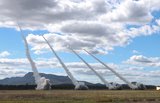Ukroboronprom tests Pelican radar
Ukroboronprom has put the 79K6 Pelican 3D surveillance radar through testing during the Rubizh 2016 military exercise, the company announced on 23 October.
The Pelicon radar is a mobile radar system weighing 17t that can be deployed in 30 minutes.
The system is designed to perform air defence. It locates enemy air targets and transfers the data to response units. As part of the AA missile system it has a range of up to 400km.
Testing during Rubizh 2016 saw a technical battalion of radio technicians provide air space control using the 79K6 Pelican for the first time. According to the company the radar demonstrated ‘reliability and outstanding technical performance’.
Following the completion of the exercise the radar will be deployed to protect the airspace over the south of Ukraine.
More from Digital Battlespace
-
![EID to unveil new vehicle communication system at DSEI]()
EID to unveil new vehicle communication system at DSEI
The Portuguese company’s naval communications system is in service across more than a dozen countries. It has turned to its home nation for support in developing a new vehicle based C2 system.
-
![Chess Dynamics successfully demonstrates Vision4ce AI-driven tracker]()
Chess Dynamics successfully demonstrates Vision4ce AI-driven tracker
The Vision4ce Deep Embedded Feature Tracking (DEFT) technology software is designed to process video and images by blending traditional computer vision with artificial intelligence (AI) algorithms to present actionable information from complex environments.
-
![Wave Relay devices cleared for security use on commercial systems in industry trend]()
Wave Relay devices cleared for security use on commercial systems in industry trend
Persistent Systems has been cleared by National Security Agency (NSA) to transmit sensitive data on commercial networks. The devices are added to the NSA’s Commercial Solutions for Classified (CSfC) component list which also includes other companies’ products providing the same security.
-
![UK teases cyber spending boost in Strategic Defence Review ahead of “imminent” release]()
UK teases cyber spending boost in Strategic Defence Review ahead of “imminent” release
The release of the UK’s Strategic Defence Review (SDR) has been long promised as mid-year. It is possible it could be as early as 2 June although the UK Ministry of Defence (MoD) continues to play its cards close to its chest.
-
![Intelsat emphasises SATCOM resilience for SOF in contested domains (video)]()
Intelsat emphasises SATCOM resilience for SOF in contested domains (video)
Intelsat outlines how its multi-orbit SATCOM architecture is enhancing connectivity and resilience for special operations forces operating in degraded and contested environments.






















